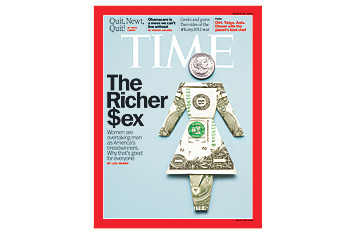
(2 of 7)
Think about what this portends. The primary role men have played since they departed the cave in pursuit of bison and woolly mammoths and marched forth in flannel suits to earn paychecks in the Mad Men era will be passed to women. The impact will be felt everywhere, from the classroom to the boardroom to the bedroom, in how men and women work, play, shop, vote, save and share and court and even love each other.
While the change is rarely in the headlines, it is often behind them: much of what liberals are calling the Republicans' war on women centers on the Pill, whose arrival 50 years ago fostered the rise of female sexual freedom and economic power. Women could delay marriage and invest in education without worrying that an unplanned pregnancy would derail their pursuit of professional goals. As jobs have moved to the low and high ends of the socioeconomic spectrum, it is women who are better equipped for the higher ground: women today make up almost 60% of U.S. college students and earn the majority of doctorates and master's degrees. Some experts predict that in 25 years, law and medicine will be female-dominated professions. Already, according to Census Bureau data crunched by Reach Advisors, a market-research firm, single childless women ages 22 to 30 in the majority of large U.S. cities now have a higher median income than their male peers.
Before women--or men--start celebrating, some cautionary notes: some academics and women's-rights advocates talk about a stalled revolution and warn that a premature declaration of victory will reduce pressure on workplaces to improve pay and working conditions. Although the portion of wives outearning their husbands has risen, the wage gap persists: women working full time earn a median wage that is 81% of what men make. This suggests that many women are supporting households on less than what a man might command. The glass ceiling remains solid; according to Philip Cohen, a sociologist at the University of Maryland, the percentage of managers who are women has risen from 35% to only 38% in the past 20 years. It is still possible for a judge to reject a sex-discrimination suit by a woman who claimed she was fired for asking if she could pump breast milk at work and to say the claim would hold up if the woman had been fired for being pregnant. In this economy, millions of women as well as men are too worried about falling out of the middle class to dream of rising above it.
But over the long term, the outlook is brighter--especially if a growing, global information economy favors an educated woman's skill set. Which raises the inevitable question, If women in the next generation are poised to do better, does it mean that men are going to do worse? Or is there a chance, if people come to think differently about money and power and gender roles, that everyone could come out ahead?
The Old Deal Is Off
